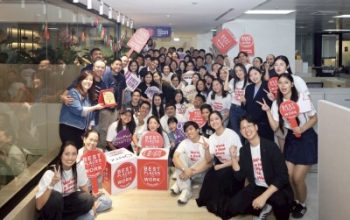SINGAPORE – 14 April 2021 – Aon plc (NYSE: AON), a leading global professional services firm providing a broad range of risk, retirement and health solutions, has released the findings of the 2021 Trends in Retirement & Financial Wellbeing survey for Singapore.
Working adults in Singapore ranked retirement planning as their top priority but an alarming 80% underestimate how much they really need to retire. While retirement support from employers is also lacking, further challenges remain around transparency in group retirement plans’ investment offerings and employees foregoing long-term perspectives to seek short-term gains.
Ashley Palmer, Regional Managing Partner, Retirement & Investments, Asia for Aon, said, “”Employers can have a significant impact on how much their employees save by instilling smart habits and healthy money behaviours. The right long-term savings vehicles, effective communications and financial tools will help Singapore’s workforce be more financially resilient in the wake of the COVID-19 pandemic.”
The survey identifies three main themes in financial wellbeing and retirement support for Singapore employees.
Financial wellbeing support is the new employee expectation. As a result, close to 40% of employers rank an employee financial wellbeing strategy as their highest priority, followed by emotional and mental wellbeing support. The survey shows that 70% of Singapore employers will formulate or execute financial wellbeing programmes throughout 2021, in line with employee expectations. Companies also view offering a financial wellbeing programme critical in increasing employee engagement and remaining competitive in the talent market.
There is an increasing trend of employer-led supplementary savings plans. Currently, 22% of companies surveyed offer Central Provident Fund (CPF) top-up contributions to citizens and Permanent Residents. But, close to 40% of the working population in Singapore are foreigners who do not have access to CPF and are likely to have foregone their retirement benefits in their home countries. To bridge this gap, and to provide equitable retirement benefits to all employee groups, close to 50% of the organisations surveyed offer supplementary retirement benefits to their foreign staff. Financial services firms are leading in this practice, followed by the technology and the healthcare sectors.
Promisingly, a third of organisations in Singapore are prioritising a thorough review of their supplementary retirement arrangements in 2021.
Alicia Brittain, Senior Consultant & Actuary, Retirement & Investments, Singapore for Aon, said, “Forward-looking companies first need to understand the financial worries of their employees and identify the gaps in their benefits offering. The most effective approaches are aimed at changing individual behaviours towards money and savings and providing accessible programmes and vehicles to deliver sustainable change. For example, when organisations provide retirement benefits as cash-in-lieu, it is most likely immediately spent and so does not form part of an emergency fund or long-term savings for the employees’ retirement years. Supplementary retirement plans solve this issue and are more flexible and cost effective – and can also offer contributions above the monthly CPF wage cap to increase employee savings.”
Employees in Singapore lack a well-defined default investment strategy. Less than 30% of the surveyed companies in Singapore currently offer their employees an investment choice in their retirement plans, and only 15% of retirement plans have a default investment fund. This leads to employees selecting their own optimal investment funds. They may lack experience in understanding investments, which can lead to misallocating their money and result in inadequate retirement savings or excessive risk taking.
Brittain added, “The key to protecting employees and adding value to savings in any defined contribution retirement plan is a well-defined default investment strategy. This includes frequent performance monitoring, actively managing investment risks and dynamically reducing investment risk as employees move towards retirement.”
About Aon
Aon plc (NYSE: AON) is a leading global professional services firm providing a broad range of risk, retirement and health solutions. Our 50,000 colleagues in 120 countries empower results for clients by using proprietary data and analytics to deliver insights that reduce volatility and improve performance.


















